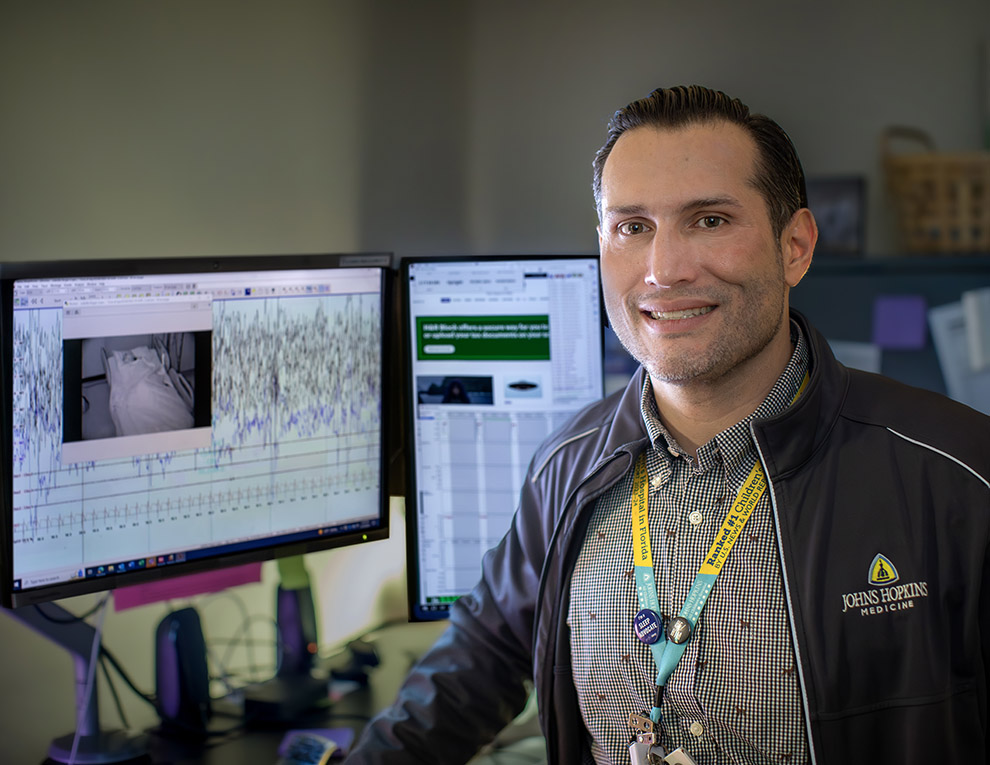Recognizing and Treating Common Sleep Disorders in Kids

Luis Ortiz, M.D., sleep medicine physician in the Sleep Center at Johns Hopkins All Children’s Hospital
Sleep plays a critical role in your health and well-being throughout life. The way you feel when you're awake often depends on how good you slept the night before. Sleep plays important roles to support healthy brain function and maintain your physical health.
Sleep deficiencies can increase the risk for some chronic health problems. It also can affect how well you think, react, work, learn and get along with others.
March is Sleep Awareness Month, which raises awareness for sleep disorders in kids. Sleep challenges may just be an occasional nightmare or behavioral issue, like staying up too late. Many of these will resolve on their own as children grow up, but some more serious sleep disorders may be hard for parents to recognize and if left untreated, can impact a child’s long-term health and quality of life.
Luis Ortiz, M.D., is a sleep medicine physician in the Sleep Center at Johns Hopkins All Children’s Hospital in St. Petersburg, Florida. The hospital has the only full-service pediatric sleep center in west-central Florida. He evaluates and treats babies and children with various types of sleep disorders, including problems falling asleep or staying asleep, snoring, sleepwalking and abnormal movement during sleep.
Here are some common conditions the Johns Hopkins All Children’s Sleep Center treats.
Sleep Walking and Sleep Talking (Parasomnias)
Sleepwalking, sleep talking and night terrors are called parasomnias. These are disorders of arousal states: One part of the brain is aroused (“awake”) while other parts of the brain are still asleep. Predisposing factors can include genetic factors, insufficient sleep, obstructive sleep apnea, or physical or emotional stress. However, travel, sleeping in an unfamiliar settings or environmental factors (someone slamming a door shut down the hall) can also be triggers. Parasomnias are not necessarily dangerous events and can occur in normally developing and healthy children. Treatment includes maintaining a safe sleep environment and addressing potential causes.
Obstructive Sleep Apnea
Air has to go through a lot of structures in the nose and mouth (your upper airway) before reaching the lungs. The muscles of the upper airway keep your airway open during wake and sleep but relax when you are sleeping. This relaxation, combined with possible enlarged structures in the upper airway, may end up blocking the airway, resulting in obstructive sleep apnea. This can cut off oxygen supply, causing many wakeups throughout the night. It has been associated with behavioral and mood problems, fatigue, and attention/concentration difficulties similar to ADHD. If left untreated, it can lead to high blood pressure, heart disease and even a stroke later in life. In many children, the removal of tonsils and adenoids is an effective treatment. In other cases, a breathing device called a continuous positive airway pressure (CPAP) machine to keep the upper airways open will help patients.
Narcolepsy
Narcolepsy is a disorder where the part of your brain in charge of helping you regulate your activity and sleep balance is not working. Many patients with this disorder may wake up feeling rested, but after a few hours, it may feel like they have not slept in days. This can cause excessive daytime sleepiness, impact participation in school activities and lead to suffering grades. The most effective treatment is medication.
Restless Legs Syndrome
Restless legs syndrome is a disorder in which patients complain of a strong urge to move their limbs. It typically occurs when at rest and predominantly in the evening. This sensation is often hard to describe, but words such as tingling, burning, itching, tickling or throbbing have been used. This can make it difficult to fall asleep and stay asleep. Movement improves the sensation, but begins again once you stay still. Typically, this can be managed with just a few lifestyle changes, but more severe symptoms may call for medication.
Insomnia
Insomnia is difficulty falling asleep or staying asleep and is a common complaint that most people experience in their lives. Stress, both physical and psychologic, are typical causes. In younger children, certain routines like sleeping with a parent or having a bottle at bedtime can cause issues when parents try to change the routine. Older children and teens might have behavioral factors such as going to bed and waking up at different times each day, disrupting the body's natural sleep-wake cycle. The best treatment for insomnia is a regular bed routine and limited stimulation before bedtime. Severe insomnia can be treated with cognitive behavioral therapy for insomnia (CBT-I), which does not involve medications.
When should you see a doctor for sleep problems?
“Some sleep disorders can be easily diagnosed and treated by your pediatrician,” Ortiz says. “Children with more complex issues may be referred to a sleep specialist, such as the Johns Hopkins All Children’s Sleep Center, which evaluates and treats sleep disorders.”
How do you diagnose a sleep disorder?
The medical team in the Johns Hopkins All Children’s Sleep Center consists of sleep medicine physicians, nurse practitioners and registered sleep technologists. They also work closely with pulmonology, neurology, genetics, psychology, plastic surgery, cardiology and occupational therapy to provide each patient with personalized care.
What is a sleep study?
While in the Sleep Center, patients may stay overnight and participate in a sleep study. The study will measure physiologic activity while the patient sleeps. This includes brain wave activity, airflow in and out of the mouth, heart rate and heart rhythm, oxygen and carbon dioxide levels, leg moving, jaw grinding and eye movement.
“A sleep study will give us good sleep data and will most often help us confirm a sleep disorder,” Ortiz says.
The Sleep Center at Johns Hopkins All Children's Hospital
The Johns Hopkins All Children’s Sleep Center evaluates and treats premature infants to young adults with any type of sleep disorder, including problems falling asleep or staying asleep, snoring, sleepwalking and abnormal movement during sleep.
